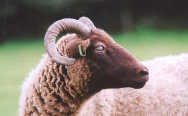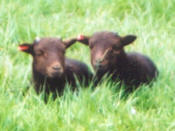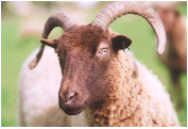Our Flock

We rear Manx Loaghtan sheep, a primitive rare breed thought to have been introduced into the UK by the Vikings. This striking, multi-horned Iron Age breed is significantly lower in fat and cholesterol than commercial breeds, produces dark gamey meat and is prized for its fleece and wool.
Our animals grow slowly and naturally on our organic wildflower meadows and hay. We know each and every animal in our small flock and care for them every day of their lives. Our lamb and mutton has won the highest awards at the National Organic Food Awards, judged by top chefs.
"One of my favourite sources for lamb is Langley Chase Organic Farm."
Rick Stein
 The rams Manx Loaghtan rams are striking, powerful animals often with four horns. For most of the year the rams are kept together, in a sort of 'boys club'. In October they are introduced to the ewes to breed. This is called tupping. We have three blood lines running through the flock and breed all our own rams.
The rams Manx Loaghtan rams are striking, powerful animals often with four horns. For most of the year the rams are kept together, in a sort of 'boys club'. In October they are introduced to the ewes to breed. This is called tupping. We have three blood lines running through the flock and breed all our own rams.
 Breeding ewes
Breeding ewes
These female sheep make up the majority of the flock, and are put to the tup in November. The rams and ewes stay together from about three months, and nature is allowed to take it course. Hormone treatments or other treatments to manipulate breeding are never used. Lambs are born from March to April. This long lambing window is a result of this natural breeding process.
 Young lambs at grass Lambs
Young lambs at grass Lambs
The lambs are born from March to April and reared through the summer on our organic pasture before being sold in early Autumn. Those born in late April or May tend to stay on the farm until the following year. This slow and natural process helps give the meat more taste and flavour. The lamb finishing page provides more details.
 A young ewe Ewe replacements
A young ewe Ewe replacements
Every flock of sheep has new breeding ewes coming into the flock. We breed all our own flock replacements and bring the ewe lambs into the flock at two, or more, years old, not at six months old as is commonly practiced as we feel this is too young and places too much stress on the animal.
